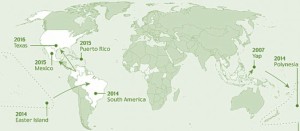At the beginning of this month the World Health Organization declared a Public Health Emergency of International Concern to initiate a coordinated international response to minimize the threat in affected countries and reduce the risk of international spread of the Zika virus. Sounds serious, doesn’t it? And it is quite serious – for the most vulnerable group are pregnant women or women who plan to get pregnant. WHO hasn’t found health justification for restriction on travel or trade, there are concerns regarding spreading of the virus.
Let’s start with basics.
What is Zika virus and how does a person become infected?
Zika is a mosquito borne virus that is closely related to dengue. It can be found in animals in many parts of Asia or Africa and without any outbreaks in humans. Between 2013 and 2015 large outbreaks of Zika took place in a number of Pacific countries. In 2015 and continuing in 2016 large outbreaks were observed in Americas.
It spreads by the bite of an infected Aedes-species mosquito, especially Aedes aegypti called also the dengue mosquito. These mosquitos live often around buildings in urban areas.
There are also isolated cases of transmission through sexual contact or blood transfusion. The virus remains in the blood for about a week. How long the virus remains in semen is currently not known.
Symptoms
They include but are not limited to: mild fever, skin rashes, conjunctivitis, muscle and joint pain, malaise or headache. Sic! Symptoms are mild and last up to a week. Only 1 in 5 people infected with the Zika virus will develop symptoms.
Women trying to become pregnant or who are thinking about becoming pregnant are strongly advised to consult their doctor before traveling to these areas and they need to strictly follow steps to prevent mosquito bites during the trip.
Treatment
At the moment there is no specific treatment for Zika, but supportive medical care can be provided if required (e.g. rest, fluids).
Prevention
Currently there is no vaccine for Zika. Prevention relies on avoiding mosquito bites in areas affected by Zika.
Due to concerns about the possibility of severe outcomes for unborn babies, women who are pregnant or seeking to become pregnant should consider avoiding or postponing their travel to areas with outbreak of Zika. Agencies investigating the Zika outbreaks are finding an increasing body of evidence about the link between Zika virus and microcephaly.
The risk of Zika transmission through sex is low, the use of condoms should be considered as a precaution.
Travellers should follow recommendations to avoid mosquito bites at all times when travelling to countries where there is risk of mosquito-borne diseases. Techniques :
- Insect repellents containing either DEET, picaridin, IR3535, or certain oil of lemon-eucalyptus or para-menthane-diol products (citronella)
- Applying first sunscreen and then insect repellent
- Treating clothing with permethrin or purchase permethrin-treated clothing
- Wearing long-sleeved shirts and long pants
- Staying in air-conditioned rooms or using window/door screens
- Sleeping under a mosquito bed net
- Emptying standing water from containers (e.g. vases, flowerpots, buckets)
Sources: http://www.who.int/mediacentre/factsheets/zika/en/ http://www.health.gov.au http://www.cdc.gov










